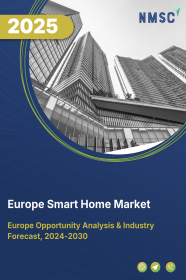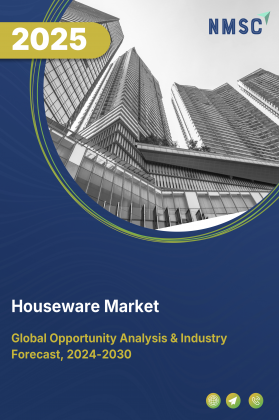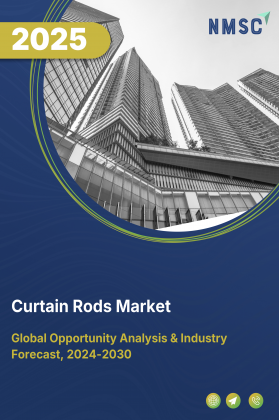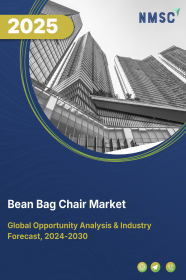
Europe Smart Home Market by Product Type (Security & Access Control, Lighting & Electrical Controls, Energy Management & Controls, Climate & Comfort, Smart Appliances, Home Entertainment, Control & Automation, and Others), by Installation Type (DIY, Professional, Hybrid), by Sales Channel (Online, Retail, and Professional)– – Opportunity Analysis and Industry Forecast, 2024–2030.
Industry: Retail and Consumer | Publish Date: 29-Oct-2025 | No of Pages: 265 | No. of Tables: 194 | No. of Figures: 159 | Format: PDF | Report Code : RC2276
Europe Smart Home Market Overview
The Europe Smart Home Market size was valued at USD 34.08 billion in 2023, and is predicted to reach USD 119.22 billion by 2030, at a CAGR of 19.6% from 2024 to 2030. A smart home, alternatively termed a connected home, denotes a dwelling furnished with cutting-edge technology and automation systems facilitating the centralized control and surveillance of diverse household devices, appliances, and security features via a unified network. These intelligent devices are remotely operable and frequently responsive to voice commands or predefined schedules, thereby augmenting convenience, energy efficiency, and security for homeowners. Common components of connected homes encompass smart thermostats, lighting systems, security cameras, voice assistants, and other interconnected devices aimed at enhancing the overall residential lifestyle.
Integration Of Artificial Intelligence (ai) And Data Analytics Enhances Smart Home Functionality And User Experience
The growing integration of artificial intelligence (AI) and advanced data analytics is transforming how European consumers interact with smart home systems. AI-enabled devices now analyze user habits, energy usage patterns, and environmental factors to automate daily operations and optimize resource consumption. For instance, predictive algorithms can adjust lighting and heating based on occupancy or weather forecasts, creating a more efficient and personalized living environment. This intelligent automation significantly enhances user convenience while promoting sustainability—two priorities strongly influencing European consumer behavior.
Additionally, AI’s role in improving interoperability between devices and platforms is accelerating the adoption of integrated ecosystems. As manufacturers increasingly embed voice control, emotion recognition, and real-time monitoring capabilities into smart devices, consumers are experiencing higher functionality, better responsiveness, and seamless cross-device communication. This evolution positions AI as a central growth driver for the European smart home market, enabling smarter, safer, and more energy-efficient homes.
Expanding 5g Connectivity And Digital Infrastructure Boosts Smart Home Ecosystems
The rapid rollout of 5G networks and high-speed broadband infrastructure across Europe is unlocking new potential for smart home connectivity. With faster data transmission, ultra-low latency, and improved reliability, 5G enables real-time communication between multiple devices—supporting applications like advanced security monitoring, cloud-based automation, and immersive entertainment experiences. According to the European Commission’s Digital Decade policy, 5G coverage is expanding rapidly across EU urban areas, strengthening the foundation for connected living.
This robust infrastructure is also fostering the development of edge computing and cloud-integrated platforms, which enhance system responsiveness and data processing efficiency. As connectivity becomes more accessible even in semi-urban and rural regions, smart home technologies are reaching a broader audience, driving mass-market adoption. Consequently, the synergy between improved network infrastructure and evolving digital ecosystems is a key enabler of sustained growth and technological advancement in the European smart home market.
Lack Of Device Interoperability And Standardization Hinders Seamless Smart Home Integration
A key restraint in the European smart home market is the lack of interoperability and standardized communication protocols among devices from different manufacturers. Despite rapid technological advancements, many smart home products still operate within proprietary ecosystems—making it difficult for users to integrate devices from multiple brands. This fragmentation limits the scalability and convenience of connected home systems, as consumers are often required to manage separate apps or hubs to control different devices.
While initiatives like the Matter protocol (supported by major industry players) aim to establish a universal connectivity standard, adoption across Europe remains gradual. Many legacy systems are incompatible with new frameworks, creating challenges for homeowners seeking seamless upgrades or cross-brand integration. For developers and installers, the absence of consistent interoperability also increases system complexity and installation costs.
This lack of standardization not only affects user experience but also slows market expansion by discouraging potential buyers who prioritize simplicity and reliability. Until a unified communication framework becomes widely adopted, fragmented ecosystems and compatibility issues will continue to pose a significant restraint to the growth of the European smart home market.
Integration Of Artificial Intelligence (ai) And Edge Computing Drives Next-generation Smart Home Evolution
The convergence of artificial intelligence (AI) and edge computing represents one of the most promising future opportunities for the European smart home market. As homes become increasingly connected, the ability to process data locally—rather than relying solely on cloud infrastructure—will enable faster, more secure, and more efficient automation. AI-powered systems can analyze user behavior in real time, predicting preferences such as lighting, temperature, or appliance usage, while edge computing ensures that sensitive data is processed within the home environment, reducing latency and enhancing privacy.
This technological synergy directly aligns with Europe’s growing emphasis on data sovereignty, sustainability, and digital independence. By reducing the need for constant cloud communication, AI-driven edge solutions minimize energy consumption and network congestion—key priorities under EU sustainability and digital transformation frameworks. Furthermore, the evolution of AI algorithms enables continuous learning, allowing devices to adapt to individual lifestyles and environmental conditions without user intervention.
As European consumers increasingly seek personalized, secure, and energy-efficient living environments, the integration of AI and edge computing will redefine smart home functionality—from predictive maintenance and adaptive energy management to proactive home security. This emerging trend not only enhances user experience but also opens new pathways for innovation among manufacturers and service providers, marking a pivotal opportunity for the next phase of smart home growth across Europe.
The UK Dominates the Europe Smart home Market Share
The rising prevalence of connected homes and interconnected devices propels the expansion of the smart home market in the UK. Smart technology adoption within households surged significantly, jumping from 14.9% in 2021 to 39.0% by 2022. Among the most coveted connected home features are lighting, heating, and security systems, with smart plugs gaining traction due to their remote power control capabilities.
Additionally, the presence of key players in the UK market serves as a driving force behind the growth of the smart home industry. Established and reputable companies maintain a robust presence, offering consumers a plethora of options and advanced robotic cleaning solutions.
For example, Centrica's Hive, a prominent player in the connected home sector, introduced an innovative connected home monitoring service. This service empowers homeowners to conveniently safeguard their residences using their smartphones. By providing accessible and intuitive ways to protect homes and loved ones, such offerings likely contribute to the enhancement of the connected home market.
Finland to Witness Substantial Growth in the Europe Smart home Market Trends
The increasing urbanization in Finland is fuelling the expansion of the smart home market in the country. With a growing proportion of the Finnish population migrating to urban centers, there is a noticeable upsurge in the demand for connected home automation. The appeal of urban living, characterized by its fast-paced lifestyle and modern conveniences, spurs the need for innovative solutions that simplify daily tasks.
This trend seamlessly aligns with the adoption of connected homes, which offer an efficient and time-saving approach to maintaining tidy living spaces. With approximately 85.8% of Finland's population residing in urban areas as of 2023, the market for autonomous cleaning devices is primed for significant growth, reflecting the broader global trend toward connected living and intelligent home solutions.
Furthermore, the rising disposable income in Finland paved the way for increased adoption of smart home appliances and cutting-edge technologies across the country. With an average household net-adjusted disposable income per capita of USD 33,471 annually, Finland surpasses the OECD average of USD 30,490 annually.
This higher income level enables Finnish households with the financial means to invest in advanced home automation solutions that enhance convenience and streamline daily routines. Among these solutions, connected homes emerged as a popular choice, allowing homeowners to enjoy cleaner living spaces with minimal effort. The robust economic landscape in Finland, characterized by the elevated disposable income of its residents, serves as a crucial driver in the growth of the connected home market within the nation.
Competitive Landscape
Several key players operating in the Europe smart home industry include Amazon (Echo/Alexa), Apple (HomeKit), Google (Nest), Samsung Electronics, Robert Bosch GmbH, LG Electronics (ThinQ), Xiaomi, Schneider Electric (Wiser), ABB Ltd. (free@home), Whirlpool Corporation, ASSA Abloy (Yale), Legrand Group (Netatmo), Signify N.V. (Philips Hue), Resideo Technologies, Lutron Electronics, Somfy Group (TaHoma Hub), Nice S.p.A., Control4 (SnapAV), tado GmbH, and Comelit Group S.p.A. and others.
Europe Smart Home Market Key Segments
By Product Type
-
Security & Access Control
-
Smart Cameras
-
Video Doorbells & Intercoms
-
Electronic Locks
-
Alarm Panels and Kits
-
Door and Motion Sensors
-
-
Lighting & Electrical Controls
-
Smart Bulbs & Fixtures
-
Smart Light Strips
-
Smart Switches & Dimmers
-
-
Energy Management & Controls
-
Smart Plugs & Outlets
-
Smart Breakers
-
Energy Monitors
-
Home Load Controllers
-
-
Climate & Comfort
-
Smart Thermostats
-
HVAC Controllers
-
Smart Vents
-
Air Quality Monitors
-
-
Smart Appliances
-
Large Appliances
-
Refrigerators
-
Washing Machines and Dryers
-
Dishwashers and Ovens
-
-
Small Appliances
-
Robot Vacuums
-
Kitchen IoT Devices
-
Other Small IoT Appliances
-
-
-
Home Entertainment
-
Smart Speakers & Displays
-
Streaming Devices & Media Controllers
-
-
Control & Automation
-
Hubs & Gateways
-
Automation Controllers
-
Wall Panels and Keypads
-
Motorized Blinds and Garage Controllers
-
-
Other Products
By Installation Type
-
DIY
-
Professional
-
Hybrid
By Sales Channel
-
Online
-
E-commerce Marketplaces
-
Direct-to-Consumer (DTC)
-
-
Retail
-
Electronics Retailers
-
Supermarkets & Hypermarkets
-
Specialty Stores
-
-
Professional
-
Electrical Contractors
-
System Integrators
-
Telecom Providers
-
Property Developers
-
By Country
-
The U.K.
-
Germany
-
France
-
Italy
-
Spain
-
Denmark
-
Netherlands
-
Finland
-
Sweden
-
Norway
-
Russia
-
Rest of Europe
Key Players
-
Amazon (Echo/Alexa)
-
Apple (HomeKit)
-
Google (Nest)
-
Samsung Electronics
-
Robert Bosch GmbH
-
LG Electronics (ThinQ)
-
Xiaomi
-
Schneider Electric (Wiser)
-
ABB Ltd. (free@home)
-
Whirlpool Corporation
-
ASSA Abloy (Yale)
-
Legrand Group (Netatmo)
-
Signify N.V. (Philips Hue)
-
Resideo Technologies, Inc. (Honeywell Home)
-
Lutron Electronics
-
Somfy Group (TaHoma Hub)
-
Nice S.p.A.
-
Control4 (SnapAV)
-
tado GmbH
-
Comelit Group S.p.A.
Report Scope and Segmentation:
|
Parameters |
Details |
|
Market Size in 2023 |
USD 34.08 Billion |
|
Revenue Forecast in 2030 |
USD 119.22 Billion |
|
Growth Rate |
CAGR of 19.6% from 2024 to 2030 |
|
Analysis Period |
2023–2030 |
|
Base Year Considered |
2023 |
|
Forecast Period |
2024–2030 |
|
Market Size Estimation |
Billion (USD) |
|
Growth Factors |
|
|
Countries Covered |
20 |
|
Companies Profiled |
10 |
|
Market Share |
Available for 10 companies |
|
Customization Scope |
Free customization (equivalent up to 80 working hours of analysts) after purchase. Addition or alteration to country, regional, and segment scope. |
|
Pricing and Purchase Options |
Avail customized purchase options to meet your exact research needs. |

















 Speak to Our Analyst
Speak to Our Analyst
























